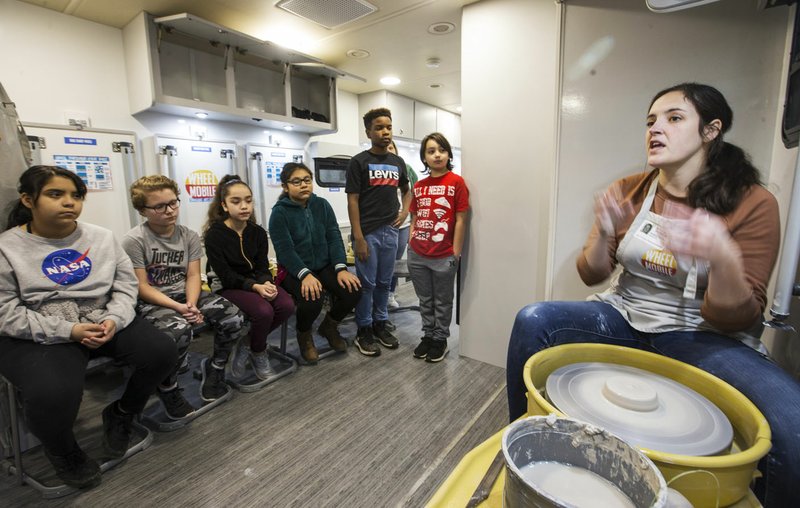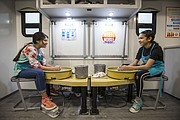FAYETTEVILLE -- The Community Creative Center's Wheel Mobile is improving the quality of life for Northwest Arkansas, one thrown pot at a time, according to the center's executive director.
"It's feeding the economy, and we're employing people, and we're giving people things to do," said Barbara Putman. "I think we're like a model case. It just seems like we're doing what the arts should be doing."
Spend time with Arty
Wheel Mobile arts education programs support curriculum and enhance classroom learning. When the Wheel Mobile comes to campus, schools save time, energy and resources. Free and reduced-price programming is available for high-need schools and qualifying nonprofit organizations in Northwest Arkansas. Email tricia@communitycre… to learn more.
Source: NWA Democrat-Gazette
Nicknamed "Arty," the mobile makerspace began traveling the region in January 2017.
It is part of the Creative Center, which is a nonprofit studio and visual arts venue at the Walton Arts Center's Nadine Baum Studios on West Avenue, and offers classes and workshops for personal and professional development.
The 33-foot Wheel Mobile is a custom-designed recreational vehicle built to house nine pottery wheels and supplies, Putman said. Tables mounted above the wheels are pulled down from the wall to form work spaces.
"I wanted it to be designed exactly for what we do," she said.
Accessible education
The mobile has visited schools, and private and public events, laying the groundwork for enhancing education, increasing accessibility and contributing to the economic growth of the region, Putman said.
This is the second year the mobile has been going to schools and has already surpassed the 600 students anticipated for the 2019-20 school year, she said.
"Now we have schools booked through the rest of the school year," Putman said.
The mobile parks at schools for two or three days to teach students how make pottery, she said.
"It was an amazing experience," said Linda Skelton, art education director for Springdale Public Schools and the art teacher for Tyson and Jones elementary schools.
Skelton said she scheduled the mobile to work with fifth-graders at both schools this year.
Taking students on a field trip for the same level of art education they received through the mobile wouldn't have been feasible, she said, noting the district has an art budget of $3 per student for the entire school year.
"We would not have had the money to do it," Skelton said, explaining it would have cost each school $2,000 for the same experience.
The center offered the mobile at both schools for free through grants from the Walton Family Foundation, Putman said.
Schools with 60% or more students who qualify for the free or reduced-price lunch program may qualify for the grants, she said.
Tyson Elementary School has more than 70% of its students who qualify for free or reduced-price lunches, and Jones Elementary School has 99% of its students who qualify, Skelton said.
"It's an amazing experience we otherwise wouldn't get," she said.
The fact students didn't have to leave school was valuable for their overall education as well, she said.
"They come to us, so we rotate the kids out and it maximizes our instructional time so we don't have to be gone all day," Skelton said. "That's invaluable too -- not losing that instructional time."
The mobile features an awning that can be used to shelter a portable pottery wheel to ensure students in wheelchairs have the same access as their peers, Putman said.
The mobile and its staff also create opportunities for special-needs students to help overcome learning barriers, Skelton said.
"We try to differentiate in the classroom, but when we have more people helping, it's easier," she said of the mobile's specially trained staff. "Every kid got to make something. Every student was successful," Skelton said.
The mobile is a memorable experience for the students, she said.
"Creativity helps people be happier," Skelton said. "It's the pure joy on their faces when you go out there and see them working, because it's something they don't usually get to do -- working with their hands like that."
Reputation matters
The mobile creative space also is a marketing tool for the Creative Center, Putman said.
"We want to use this as a recruitment tool to get people here as well, and it's working," she said. The venue increased its adult pottery classes from two to four in January.
"It was just like a perfect storm sort of thing," she said. "We don't have any days left to offer the wheel class, because we've got every day filled. It's just amazing."
The center's budget has also increased from $120,000 when Putman came on staff in 2013 to $460,000 in 2019, she said. The center's clientele has also grown from about 1,200 people to some 6,000.
The mobile is available to be rented for special events and team building activities.
Using mobile creative spaces to build the reputation of an art venue can be far reaching, said Eric Meek, manager of hot glass programs at the Corning Museum of Glass in Corning, N.Y.
The museum's Mobile Hot Shop visited Crystal Bridges Museum of American Art in 2017 for the "Chihuly: In the Forest" exhibit.
"It really made a lot of sense for us to take what we were doing here and give that experience to institutions around the country," Meek said. "It's especially effective when we go to somewhere like Crystal Bridges that is showing the work of a contemporary glass artist."
The Hot Shop is a 48-foot-long, fully functioning mobile glass blowing studio built in a semitrailer, he said.
"We have 300 pounds of molten glass in there, all kinds of color -- everything that you would need to create really exciting work," Meek said of the demonstration space.
"It's very intangible, the effects, but we really feel like reputation building and being a good ambassador anywhere in the country will lead to good to things here at our museum," Meek said.
Rolling forward
The center is considering how it can further improve the quality of life for Northwest Arkansas through art education by making plans to improve its mobile engagements, Putman said.
The first step will be to buy a support vehicle for the Wheel Mobile to move staff and art projects back-and-forth from the school to the center, she said.
"There's a lot of logistics," Putman said, explaining the clay pieces have to be taken to the center daily to be fired in the kiln. Staff members often are using personal vehicles to meet this need, she said.
Putman said the center doesn't have an estimated cost for the support vehicle yet, but hopes to buy it within the next year.
The center also might buy a second mobile creative space in three to four years that it's already dubbing "Arty Jr.," she said. The cost isn't known yet.
"It would probably be a traveling 2D art studio," Putnam said, noting "Arty" would still be solely used for pottery.
NW News on 02/17/2020


